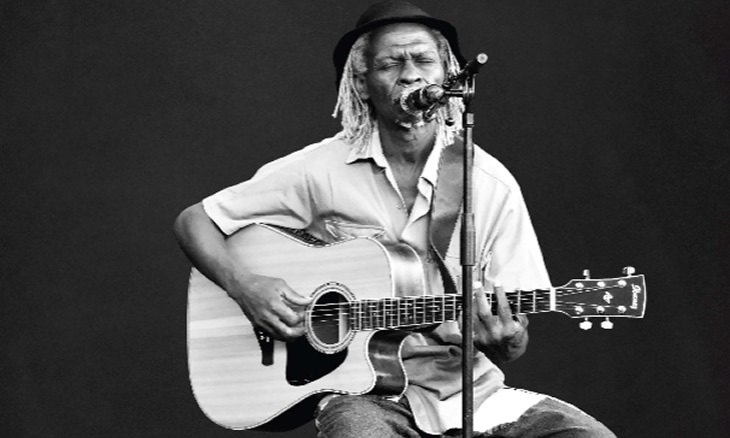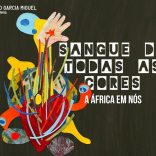Mozambique's Sebastião Coana opens 'Echoes of Earth' exhibition in Katara, Doha
Mozambique: Tributes pour in for Chico António

Image: O País
Mozambican musician Chico António died on Saturday 13th in Maputo, aged 66.
Shocked, artists and fans turned to Facebook to pay tribute to Chico António, who had spent the week in Maputo Central Hospital.
Here are some messages:
“Until forever, Chico! Your legacy is enormous” – Stewart Sukuma.
“Chico António, will be an eternal reference” – João Ribeiro, filmmaker.
“Let’s bring our spirits and bodies together again. Somewhere we will have that party spirit. Wait for me right there” – Filimone Meigos, poet.
From the streets to the big stages
Born in 1958 in Magude, a rural district in the province of Maputo, he went to live in the then city of Lourenço Marques at the age of six, sleeping on the streets after escaping the harsh daily task of grazing 50 heads of cattle, 30 goats and 10 sheep.
Magude’s escape by train followed the disappearance of half the cattle when he fell asleep in the pasture. Chico António feared his father’s reprisals and never saw his parents again.
This phase of his childhood is portrayed in the song João Gala Gala, from his only album, “Memórias”. In it, Chico sings: “Joao Gala Gala, school age, is begging in Ponto Final, every day is the same, cold, hot, rain, shine (…) João Sofrimento’s future will be nothing more than a rude hut (…) unless the south wind comes and brings him a magic wand so he doesn’t become a vagabond…”
Chico escaped the life of a vagabond in 1964, when he was adopted by the couple José Ferreira dos Santos and Lili Ferreira, who managed to get him a place at the Catholic Missão São João de Lhanguene boarding school, where he attended primary school and began his musical studies. At the age of nine he was already a soloist in a choir of 50 people, learning trumpet and solfeggio. Thus began his musical career.
“I’m a Gregorian,” Chico António said in an interview in 2014, referring to what he learned in the Catholic Church. “Outside the church, my references were Xidiminguana, Wazimbo, Alberto Machavela, Osibisa, Fela Kuti, Third World, Jimmy Cliff, Manu Dibango, Sting, Uriah Heep, Led Zeppelin, The Police, Yes, Alice Cooper, among others.”
Based on these, at the end of the 1970s, Chico was working as a music professional in groups such as ABC-78, Grupo Instrumental N°1 of light music, Rádio Moçambique band RM, and Orquestra Marrabenta Star de Moçambique, with whom he toured Mozambique, Cape Verde, Guinea Conakry, Zimbabwe, Denmark, France, Holland, England, Italy, Portugal, Sweden and Norway.
RM Group
The RM Group was undoubtedly the most important in terms of national and international projection. In the group supervised by Rádio Moçambique, the national broadcaster, Chico worked with some of the best musicians in the country, such as Alexandre Langa, Sox, Alípio Cruz, Zé Mucavel, Zé Guimarães and Mingas. The group’s main mission was to produce music for radio broadcasts.
As a member of this group, he created “Baila Maria”, performed in a duet with Mingas. In 1990, the theme won the grand prize in the Discoveries competition, run by Radio França Internacional. In the same year and following the award, Chico went to Paris to further his studies in music.
“In France, I was tutored by the great Cameroonian saxophonist Manu Dibango. I took classes in basic piano techniques, musical arrangements and musical recording. I lived with personalities like Salif Keita or Pierre Bianchi. These were two years of intensive training and at the end I felt glorious,” said Chico. “The veteran saxophonist always advised me to complete my studies and return to the country to research and elevate the traditional rhythms of Mozambique.”
As part of the Discoveries prize, Grupo RM won the opportunity to record an album. “I gave the group the name ‘Amoya’ and we recorded the album ‘Cineta’, which was released in 1991, in Paris,” said Chico.
Returning to the country, and following Manu Dibango’s advice, he invested in traditional music research and created Amoya, Studio and Art Gallery, and opportunities for musical collaboration in audio-visual and theatrical productions emerged.
In February 2013, Chico António joined Projecto Trânsito with Chude Mondlane, Edmundo Matsielane and Nico M’Sagarra. The group’s idea was to musically tell the different experiences of its members, using expressions and instruments from different origins.
Memoirs
In 2014, Chico António released “Memórias”, and said that “it took me a while to release the album, because I was never interested in working with record companies. I’m a trumpet player and I’ve been behind many artists. I like working with music”.
Asked if he wasn’t interested in publishing more albums, Chico replied: “I swear, my father’s soul, I don’t like fame, I’ve never been interested in fame.”
Descansa em paz, tio Chico António.
Moçambique perde mais um dos seus colossos musicais.
A tua Maria bailará para toda a eternidade. pic.twitter.com/n2JgUqVIhG
— Bayano Valy 🇲🇿 (@BayanoValy) January 13, 2024












Leave a Reply
Be the First to Comment!
You must be logged in to post a comment.
You must be logged in to post a comment.